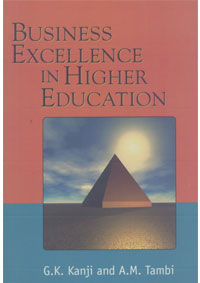Business Excellence in Higher Education
ISBN: 0-952791-22-6
Date Published: September 2002
Availability: In Stock
Strategies and systems for sustaining business excellence in the manufacturing and industrial sectors have been developing at a relentless pace. Several aspects of such practices have been regarded as having great potential for both the public and service sectors. This realisation is now at the forefront of thinking of public sector strategists and more importantly those who allocate and determine the funding of such services, ie central government. Frameworks, mechanisms and systems in use for developing business excellence abound. Some are generic and are trasferable across sectors, such as Total Quality Management (TQM) and Excellence Model; others are sector specific.
The higher education sector has been grappling with reforms driven by concerns for greater accountability and continuous improvement from stakeholders including academics, employers, students, tax payers etc. The adoption of sector specific quality assurance systems, subject reviews, research assessment and audits is now well embedded. These practices are, however, synonymous with TQM systems, but at the present time few systematic attempts have been made to empirically test cause and effect relationships between TQM practices and institutional effectiveness in higher education.
In this compelling and insightful book Prof. Gopal Kanji and his collaborator have expanded the concept of TQM critical success factors and have applied the Excellence Model specifically to the higher education sector. The book is based on empirical work demonstrating the potential value of TQM critical success factors and Excellence model to the higher education sector. It provides an in-depth account of strategies and techniques for measuring and assessing excellence and continuous quality improvement in higher education.
The book provides:
- a rationale for the use of TQM in higher education;
- a detailed account of the identification and measurement of critical success factors;
- a background and application of the Kanji's Pyramid Model in context of assessing business excellence;
- tools, techniques and the application of the Excellence Model in higher edcation institutions.

